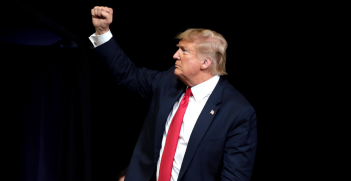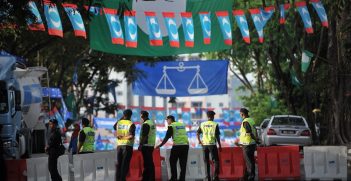Bolsonaro’s War on the Environment and Climate Change

Brazil’s current administration is turning the country into an “exterminator of the future” and is interfering with emerging data on Amazon deforestation.
Since far-right populist President Jair Bolsonaro seized office last October, we have witnessed a significant change in Brazil’s environmental policies and international posturing regarding the Amazon’s deforestation.
Bolsonaro is deemed by many as “Trump of the Tropics.” But Brazil is not the United States: it is a country with deep roots in political authoritarianism. Having lived through 21 years of military dictatorship, Brazil’s far-right populism and the resurgence of political authoritarianism is increasingly a threat to Brazilian’s democratic freedoms. The incumbent administration is unashamedly revising Brazil’s environmental protection laws and now is attempting to interfere with emerging data on the deforestation of the Amazon’s rainforest. These are all matters of great concern.
Bolsonaro’s Ideology on the Environment and Climate Change
Bolsonaro is wasting no time: only eight months into office and he has aggressively revised Brazil’s environmental laws and protections. As argued by Brazilian politician and environmentalist activist Marina Silva from the Sustainability Network Party, together with other seven former environmental ministers, the current administration is turning Brazil into an “exterminator of the future.”
Allegedly, the eight former ministers who served in governments across the political spectrum since the re-democratisation period, raised concerns that the current administration is systematically reshaping Brazil’s environmental laws. Jose Sarney Filho, a former environmental minister under right-wing administrations such as Fernando Henrique Cardoso in the 1990’s and more recently under the Temer government, voices his concern regarding Brazil’s new posturing regarding environmental protections. Sarney Filho argues that: “we are watching them — the incumbent administration — deconstruct everything we’ve put together … we are talking about biodiversity, life, forests … the Amazon has an incredibly important role in global warming.”
Another signal of Brazil’s dramatic shift in environmental policies and take on climate change is Brazil’s incumbent foreign minister Ernesto Araujo. Araujo holds controversial views about climate policy and argues that climate change is part of a plot by “cultural Marxists.” According to his view, climate change is a Marxist conspiracy to compromise western countries and the United States’ global standing, and increase Chinese and non-western power and influence. Araujo wrote on his blog that his main goal is to “help Brazil and the world liberate themselves from the globalist ideology,” which according to him is anti-Christian and anti-western.
Bolsonaro has not withdrawn from the Paris Accords yet. But his inner circle and anti-climate change ideology is setting the tone of Brazil’s political debate on environmental protections and climate change. Brazil’s aggressive change in environmental policies are already impacting the Amazon’s deforestation rates. July this year, Brazil’s Space Agency (INPE) issued an alert identifying 2,072 square miles of deforestation detected by the institute’s real-time detection system.
It is argued that Brazil’s rain forest deforestation has gone up 88.4 percent June this year in comparison to the same period in 2018, due to the current government lenient posturing towards illegal logging. Data released indicates a significant increase in Amazon deforestation has been on the rise since early this year. The agency measures deforestation rates annually July to July activity, and current figures show a 15 percent rise over 2018 figures.
Far-right Ideology and Increasing Authoritarianism
Recently, Bolsonaro declared in a controversial statement that: “is the Amazon for Brazilians, in the minds of Europeans? No, no … The First World wants to manage this are for themselves … Brazil is a virgin that every foreign pervert wants.” The current administration’s predominant narrative is that the Amazon is a geographically and economic strategic area, rich in minerals and natural resources. By extension, Brazil’s exploitation of these natural resources and area would benefit Brazil’s economy and strategic standing in the global community.
Creeping authoritarianism is another matter of concern is the Brazilian government. President Bolsonaro has questioned INPE data indicating a spike in the Amazon’s deforestation. The Brazilian president argued that he holds “suspicion” that the institute’s director, Professor Ricardo Magnus Osorio Galvao, “might be acting on behalf of some environmental NGO.” He continued declaring that: “With all the deforestation that you have been accusing us today and in the past, the Amazon would have already disappeared! … I have already enquired about who is in charge of our Space Agency to come forward and explain in Brasilia the data that has been sent to the international press.”
Founded in 1961, INPE is a distinguished institute internationally recognised as leader in tropical forest remote sensing technology. Bolsonaro’s criticism of the data released by the institute generated an outcry in the scientific community worldwide. As argued by São Paulo’s Academy of Sciences, “the criticisms made have no scientific basis and disregard immense contributions that the Nacional Institute for Space Research give to Brazil and to the world.”
World experts endorsed INPE methodology as cutting-edge satellite-imaging to track down deforestation levels and dismissed the incumbent administration’s accusations of data manipulation. The Brazilian government has offered no significant evidence to support suspicions that the institute’s data was flawed.
In July the institute’s director, Professor Galvao gave an interview to national broadcaster Globo where he stated that Bolsonaro’s criticism is “bar talk” and “a joke of a 14-year-old boy that is not suitable for a president of Brazil.” Professor Galvao is a member of the Brazilian Academy of Sciences and since 1976 holds a PhD from Massachusetts Institute of Technology in the United States. Additionally, the institute’s director declared that Bolsonaro was a “coward” for disputing his record without meeting him in person.
In a controversial twist, Bolsonaro fired Galvao who was appointed as head of the institute for a term of four years, ending only in 2020. The incumbent administration appointed as acting Brazil’s Space Agency director Brazil’s Airforce officer Darcton Policarpo Damião, who is a professor at Brazil’s Technological Institute of Aeronautics. Following his appointment, he declared that global warming is not “really his thing.” He added that “from what he read so far on the subject, has not come to a conclusion on the phenomenon.”
These can be signals of Bolsonaro’s increasing authoritarianism, and growing fears of a governmental crack down on political opposition and criticism to his administration.
Protecting the environment and exploring the Amazon in a sustainable way are not mutually exclusive, but under Brazil’s new era of far-right ideological blindness and political radicalism these two concepts seems irreconcilable. And by the looks of it, if Bolsonaro pushes his thought police to pursue his ideological agenda, nothing will prevent him from doing so.
Flavia Bellieni Zimmermann is a PhD Candidate at the University of Western Australia Centre for Muslim States and Societies and an active member of the AIIA WA.
This article is published under a Creative Commons Licence and may be republished with attribution.





